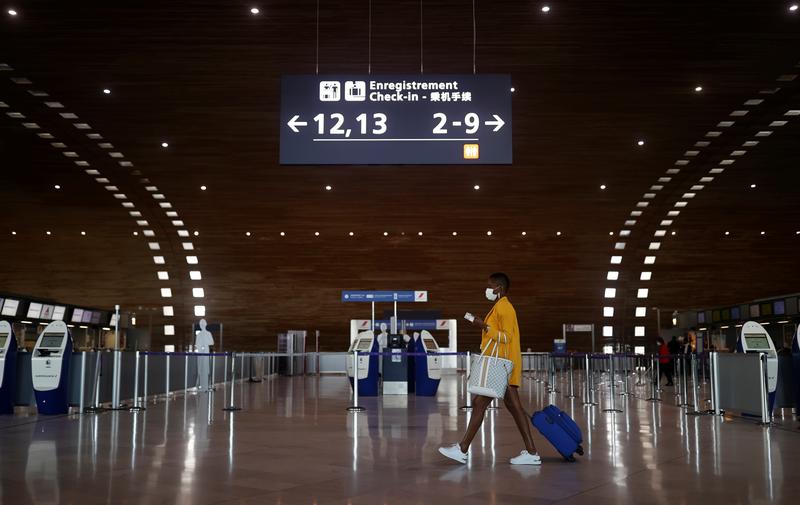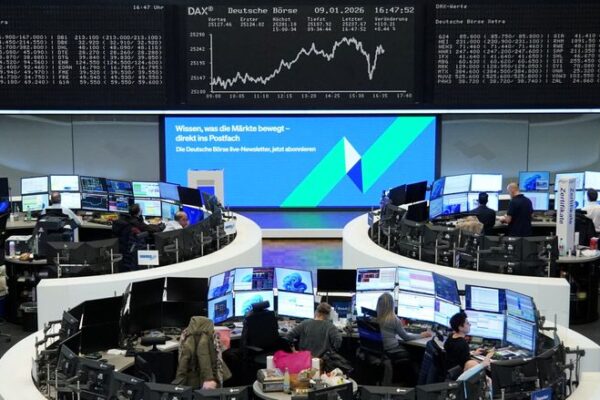Eerily silent Paris CDG marks Easter without air travel rush
PARIS (Reuters) – Easter at Paris’s Charles de Gaulle airport typically starts two weeks early as extra staff are trained to cope with one of the busiest weekends of the year. On Friday, an eerie calm pervaded Europe’s largest airport as France slides back into lockdown.
Instead of crowded check-ins and relentless take-offs and landings, rows of unused trolleys and redundant queuing barriers greeted visitors to one of the world’s busiest transport hubs.
“It’s nothing like what you would normally see,” said Amor, who has worked at the airport for 20 years, organising check-in zones and passenger assistance for an airport sub-contractor.
“The airport would be full of people going to Turkey, Greece, Morocco, Tunisia, Egypt for the spring holidays. We handled a Tunisia flight yesterday and there were 80 people,” he said. Air France typically serves Tunis with 150-seat jets.
Charles de Gaulle on Thursday handled 18.1% of the number of passengers seen on the same day in 2019, Aeroports de Paris said.
Adjusting for different dates for Easter, throughput on the few open concourses is closer to 20-25% of a usual Easter.
The enforced lull is more striking given that the airport’s 11 terminals have been condensed into two during the pandemic, though some were already closed for maintenance.
Terminal 2E, usually used by Air France and partners for U.S. flights, is handling all long-range traffic, throwing competing carriers from across the globe into a shared space.
A dedicated check-in zone for business class – worst hit by the coronavirus travel crisis – has been suspended and a large COVID-19 testing area takes up one end of the vast hall.
Europe’s border-free Schengen area is served opposite at 2F.
JOBS AT RISK
Charles de Gaulle airport, built in wheat fields northeast of Paris, has seen explosive growth since the first jumbo touched down from New York in 1974.
Terminal 2 opened in 1982 as a hub for Air France, with its undulating modular design shortening the time from gate to kerb.
The original 2B was closed for repairs before the crisis but much of the rest of the Terminal 2 complex has been transformed from a snarl of traffic jams to a bowl of deserted concrete.
The global travel slump has cast a shadow over the local economy where 100,000 people work at Charles de Gaulle, a major employer in the capital’s depressed northern suburbs.
Airport staff say less than half of those people are actively working this Easter, with the rest on furlough or finding that the usual temporary jobs have not materialised.
Up to 30,000 jobs could disappear for good, the deputy head of Paris CDG Alliance, which groups the airport’s largest employers and regional government agencies, told Le Monde newspaper.
That contrasts with crowded scenes observed this week in China and the United States, two fast-recovering markets.
On Thursday, the U.S. screened 1.56 million air travellers, 65% of the comparable 2019 level, official data showed.
In Europe, progress in pushing back a third wave of coronavirus infections has been widely described as patchy. On Wednesday, French President Emmanuel Macron ordered France into its third national lockdown.
With Easter already a wash-out, the airline industry is fretting over bookings for summer. Experts say a second lost summer would threaten more bankruptcies..
The drop in passenger numbers means fewer staff from security to cleaners and wheel-chair attendants. Check-in for one Gulf airline now uses 4 agents per flight rather than 7.
Inconsistent border rules for dealing with the pandemic further complicate the planning.
“For Denmark and Sweden we have to have 5-6 agents to check the paperwork rather than the normal two,” one employee said.
On the airport’s most southerly runway, the morning wave of long-haul jets continued to arrive on Friday from as far away as Buenos Aires, Taipei or Douala. But industry statistics show such international flights are much emptier than usual.
International travel is expected to lag short-haul trips in any eventual recovery, hobbled by a video-conferencing craze.
“Zoom is doing well,” said an airline employee who specialises in looking after premium customers.
Still, some export-dependent companies are beginning to test the water, fearing Russian, Chinese or U.S. competition.
“We have to start moving again and keep doing business,” said Marc Vacher, a production executive at French energy services company Idex, arriving early for a flight to Ukraine.
“You can’t go without face-to-face contact with customers; otherwise, it is harder to catch up later,” he added.
Additional reporting by Laurence Frost, Tracy Rucinski, David Shepardson; editing by Barbara Lewis
for-phone-onlyfor-tablet-portrait-upfor-tablet-landscape-upfor-desktop-upfor-wide-desktop-up












 Bitcoin
Bitcoin  Ethereum
Ethereum  Tether
Tether  XRP
XRP  USDC
USDC  TRON
TRON  Lido Staked Ether
Lido Staked Ether  Dogecoin
Dogecoin  Figure Heloc
Figure Heloc